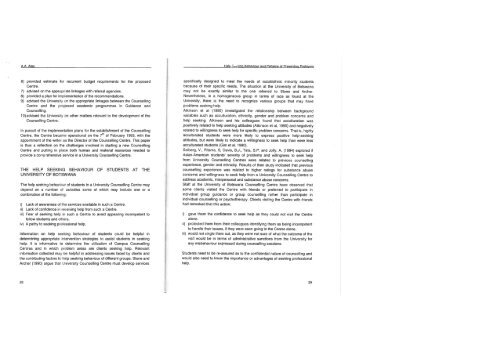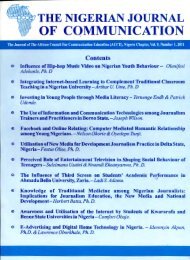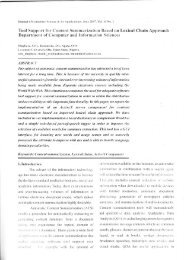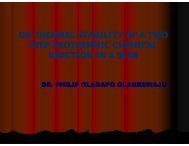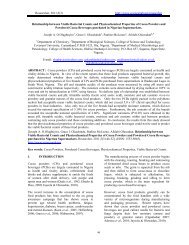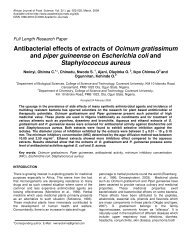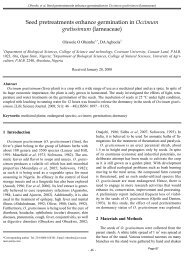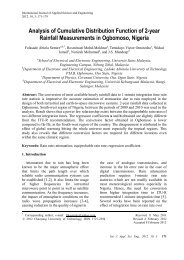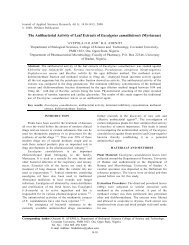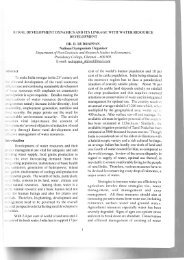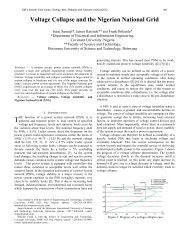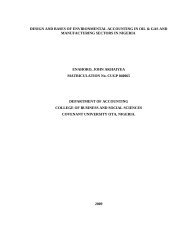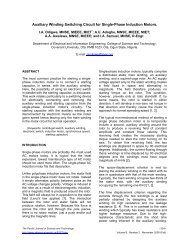Download (441Kb) - Covenant University Repository
Download (441Kb) - Covenant University Repository
Download (441Kb) - Covenant University Repository
You also want an ePaper? Increase the reach of your titles
YUMPU automatically turns print PDFs into web optimized ePapers that Google loves.
A.A. Alao<br />
Help Seeking Behaviour and Patterns of Presenting Problems<br />
6) provided estimate for recurrent budget requirements for the proposed<br />
Centre.<br />
7) advised on the appropriate linkages with referral agencies.<br />
8) provided a plan for implementation of the recommendations.<br />
9) advised the <strong>University</strong> on the appropriate linkages between the Counselling<br />
Centre and the proposed academic programmes in Guidance and<br />
Counselling.<br />
1 0) advised the <strong>University</strong> on other matters relevant to the development of the<br />
Counselling Centre.<br />
In pursuit of the implementation plans for the establishment of the Counselling<br />
Centre, the Centre became operational on the ylh of February 1993, with the<br />
appointment of the writer as the Director of the Counselling Centre. This paper<br />
is thus a reflection on the challenges involved in starting a new Counselling<br />
Centre and putting in place both human and material resources needed to<br />
provide a comprehensive service in a <strong>University</strong> Counselling Centre.<br />
THE HELP SEEKING BEHAVIOUR OF STUDENTS AT THE<br />
UNIVERSITY OF BOTSWANA<br />
The help seeking behaviour of students in a <strong>University</strong> Counselling Centre may<br />
depend on a number of variables some of which may include one or a<br />
combination of the following:<br />
i) Lack of awareness of the services available in such a Centre.<br />
ii) Lack of confidence in receiving help from such a Centre.<br />
iii) Fear of seeking help in such a Centre to avoid appearing incompetent to<br />
fellow students and others.<br />
iv) A pathy to seeking professional help.<br />
Information on help seeking behaviour of students could be helpful in<br />
determining appropriate intervention strategies to assist students in seeking<br />
help. It is informative to determine the utilization of Campus Counselling<br />
Centres and in which problem areas are clients seeking help. Relevant<br />
information collected may be helpful in addressing issues faced by clients and<br />
the contributing factors to help seeking behaviour of different groups. Stone and<br />
Archer (1990) argue that <strong>University</strong> Counselling Centre must develop services<br />
f<br />
f<br />
~<br />
t<br />
,,<br />
t.<br />
specifically designed to meet the needs of racial/ethnic minority students<br />
because of their specific needs. The situation at the <strong>University</strong> of Botswana<br />
may not be exactly similar to the one referred to Stone and Archer.<br />
Nevertheless, in a homogeneous group in terms of race as found at the<br />
<strong>University</strong>, there is the need to recognize various groups that may have<br />
problems seeking help.<br />
Atkinson et al (1990) investigated the relationship between background<br />
variables such as acculturation, ethnicity, gender and problem concerns and<br />
help seeking. Atkinson and his colleagues found that acculturation was<br />
positively related to help seeking attitudes (Atkinson et al, 1990) and negatively<br />
related to willingness to seek help for specific problem concerns. That is, highly<br />
acculturated students were more likely to express positive help-seeking<br />
attitudes, but were likely to indicate a willingness to seek help than were less<br />
acculturated students (Gim et al. 1990).<br />
Solberg, V., Ritsma, S, Davis, B.J., Tata, S.P. and Jolly, A. (1994) explored if<br />
Asian-American students' severity of problems and willingness to seek help<br />
from <strong>University</strong> Counselling Centres were related to previous counselling<br />
experience, gender and ethnicity. Results of their study indicated that previous<br />
counselling experience was related to higher ratings for substance abuse<br />
concerns and willingness to seek help from a <strong>University</strong> Counselling Centre to<br />
address academic, interpersonal and substance abuse concerns.<br />
Staff at the <strong>University</strong> of Botswana Counselling Centre have observed that<br />
some clients visited the Centre with friends or preferred to participate in<br />
individual group guidance or group counselling rather than participate in<br />
individual counselling or psychotherapy. Clients visiting the Centre with friends<br />
had remarked that this action:<br />
i) gave them the confidence to seek help as they could not visit the Centre<br />
alone.<br />
ii) protected them from their colleagues identifying them as being incompetent<br />
to handle their issues, if they were seen going to the Centre alone.<br />
iii) would not single them out, as they were not sure of what the outcome of the<br />
visit would be in terms of administrative sanctions from the <strong>University</strong> for<br />
any misbehaviour expressed during counselling sessions.<br />
Students need to be re-assured as to the confidential nature of counselling and<br />
would also need to know the importance or advantages of seeking professional<br />
help.<br />
28<br />
29


